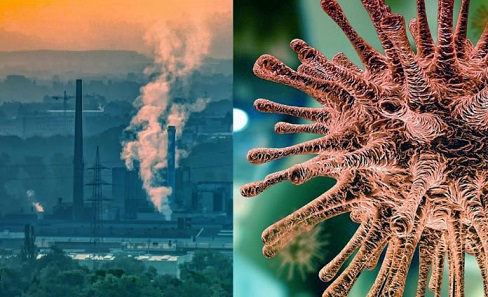Nikhil Prasad Fact checked by:Thailand Medical News Team Sep 06, 2024 7 months, 1 week, 12 hours, 26 minutes ago
Medical News: Recent study findings suggest that fine particulate matter (PM2.5) in air pollution might be playing a significant role in worsening the effects of the COVID-19 virus. In a new study by researchers from the POLARIS Research Centre at the University of Milano-Bicocca, Italy, the combined effects of PM2.5 and SARS-CoV-2 on lung cells were explored. This
Medical News report delves into the alarming results that could reshape how we view urban pollution and its impact on our health. The study is especially relevant as it helps explain why people in heavily polluted areas may suffer more from COVID-19.
 How air pollution worsens the impact of COVID-19 on our lungs
What Is PM2.5 and Why Is It Dangerous?
How air pollution worsens the impact of COVID-19 on our lungs
What Is PM2.5 and Why Is It Dangerous?
PM2.5 refers to tiny particles in the air that are less than 2.5 micrometers in diameter. These particles are so small that they can easily be inhaled and reach the deepest parts of our lungs. PM2.5 is primarily produced by combustion processes, such as vehicle exhaust, industrial emissions, and wildfires. Long-term exposure to these particles has already been linked to respiratory and cardiovascular diseases. The new research now raises concerns about how these particles interact with viruses like SARS-CoV-2, potentially making the virus more dangerous.
How PM2.5 and SARS-CoV-2 Interact
In the study, human lung cells were exposed to both PM2.5 and SARS-CoV-2. The researchers observed several alarming effects, most notably the increased expression of the angiotensin-converting enzyme 2 (ACE2) receptor. The ACE2 receptor is what SARS-CoV-2 uses to enter and infect human cells. The findings of this study indicate that PM2.5 may increase the number of ACE2 receptors on lung cells, making it easier for the virus to infect them.
The study highlights the important discovery that exposure to air pollution could significantly enhance the ability of COVID-19 to infect human lung cells.
The Experiment: Exposing Lung Cells to Pollution and the Virus
The researchers conducted a series of laboratory tests to understand how pollution affects the viral infection process. Human lung cells (A549) were exposed to PM2.5 particles collected from an urban area and were later introduced to SARS-CoV-2 viral particles. The team wanted to see how cells responded to this dual exposure, focusing on inflammation, oxidative stress, and the molecular pathways that get activated.
Their results were eye-opening. After 72 hours of exposure to PM2.5, lung cells showed a significant increase in the ACE2 receptor expression. When these cells were later exposed to SARS-CoV-2, the virus could more easily enter and infect the cells. This interaction suggests that air pollution may indeed act as a gateway for viral infections like COVID-19.
Inflammation and Oxidative Stress: How Our Bodies React
One of the study's critical findings was the role of PM2.5 in increasing inflammation in the lungs. Cells pre-exposed to PM2.5 and later introduced to the virus showed heightened levels of pro-in
flammatory markers like NF-kB and IL-8. These markers are crucial indicators of an inflammatory response, which can cause further damage to lung tissue during a viral infection.
The study also observed oxidative stress, a harmful condition where free radicals damage cells and tissues. The oxidative stress triggered by PM2.5 exacerbated the lung cells' response to the virus, making the overall infection more severe.
How Does PM2.5 Affect Virus Internalization?
The researchers studied how the virus enters cells and how PM2.5 makes this process easier. Cells exposed to PM2.5 showed a significant increase in a protein called RAB5, which is involved in the internalization process that brings the virus into the cell. This finding is crucial because it confirms that pollution not only affects how the virus infects cells but also speeds up the process.
The viral internalization process is often a slow and controlled mechanism. However, in PM2.5-exposed cells, the virus found a faster route into the cells, further complicating the infection and increasing its severity.
The Importance of ACE2 and RAB5 in Viral Infection
PM2.5 increases the expression of the ACE2 receptor, but it doesn't stop there. The study also found that after the cells were exposed to the virus, the expression of RAB5 increased significantly. This protein helps the virus enter the cells more efficiently by exploiting the overexpressed ACE2 receptors.
Interestingly, the study also revealed that the RAB7 protein, another protein involved in the endocytic process, did not show similar upregulation. This suggests that while PM2.5 helps the virus enter cells, it also allows the virus to escape degradation inside the cell. This crucial finding implies that PM2.5 not only makes it easier for the virus to enter but also lets it survive longer inside the cells.
Conclusion: Air Pollution Could Be a Silent Killer
The findings from this study are sobering. The combination of PM2.5 exposure and SARS-CoV-2 creates a perfect storm, making it easier for the virus to infect cells and increasing the severity of the infection. People living in polluted areas might be more vulnerable to severe COVID-19 infections, primarily due to the increased expression of ACE2 and the internalization process accelerated by PM2.5.
Air pollution, especially PM2.5, could thus be an overlooked factor that worsens the effects of the COVID-19 pandemic. Understanding these cellular mechanisms gives us better insight into why people in cities with high pollution levels were more severely impacted during the pandemic.
The study findings were published in the peer-reviewed journal Science of the Total Environment.
https://www.sciencedirect.com/science/article/pii/S0048969724061357
For the latest COVID-19 News, keep on logging to Thailand
Medical News.
Read Also:
https://www.thailandmedical.news/news/thailand-medical-study-finds-that-long-term-air-pollution-exposure-disrupts-kynurenine-pathway-elevating-disease-risks
https://www.thailandmedical.news/news/u-s-study-shows-that-exposure-to-air-pollutants-can-exacerbate-the-effects-of-a-covid-19-infection
